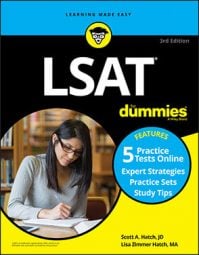Although you may concede the importance of the natural sciences, you may not be eager to find that 25 percent of your reading score is based on a chemistry passage. The good news is that the reading comprehension questions don't assume that you have any previous knowledge of the subject.
If you do come across a reading passage on chemistry and it's been 20 years since you've studied the periodic table, relax. The answer to every question is located somewhere in the passage.
You really don't need to know a lot about a passage topic to answer the questions correctly. Although it's true that chemistry majors may read a passage about polymers more quickly than someone who never took a college chemistry course, that doesn't necessarily mean chemistry experts will answer more questions correctly.In fact, they may actually be at a disadvantage because they may try to answer questions based on outside knowledge instead of using the information stated in the passage.
Reading comprehension questions test reading skills, not the plethora of details you keep tucked away in your long-term memory. When you come across a passage on a subject that you're pretty familiar with, don't rely exclusively on your outside knowledge to answer the question! Make sure the answers you choose can be justified by information contained in the passage.
Natural science passages tend to be more objective and neutral than persuasive in tone. So often, the main theme of a natural science topic is to explain, describe, or inform about a scientific event. Here's a shortened version of a nice, neutral natural science passage that may appear on the LSAT:
A logarithmic unit known as the decibel (dB) is used to represent the intensity of sound. The decibel scale is similar to the Richter scale used to measure earthquakes. On the Richter scale, a 7.0 earthquake is ten times stronger than a 6.0 earthquake. On the decibel scale, an increase of 10 dB is equivalent to a tenfold increase in intensity or power.Thus, a sound registering 80 dB is ten times louder than a 70 dB sound. In the range of sounds audible to humans, a whisper has an intensity of 20 dB; 140 dB (a jet aircraft taking off nearby) is the threshold of immediate pain.
The perceived intensity of sound is not simply a function of volume; certain frequencies of sound appear louder to the human ear than do other frequencies, even at the same volume. Decibel measurements of noise are therefore often “A-weighted” to take into account the fact that some sound wavelengths are perceived as being particularly loud.
A soft whisper is 20 dB, but on the A-weighted scale, the whisper is 30 dBA. This is because human ears are particularly attuned to human speech. Quiet conversation has a sound level of about 60 dBA.
Continuous exposure to sounds over 80 dBA can eventually result in mild hearing loss, while exposure to louder sounds can cause much greater damage in a short period of time. Emergency sirens, motorcycles, chainsaws, construction activities, and other mechanical or amplified noises are often in the 80 to 120 dBA range. Sound levels above 120 dBA begin to be felt inside the human ear as discomfort and eventually as pain.
Don't let the unfamiliar scientific concepts worry you. You're probably familiar with the term decibel, but you may have never encountered the A-weighted decibel or dBA, as it's abbreviated. Focus on the main point, which in this passage is to describe dBAs and how human ears perceive them.

